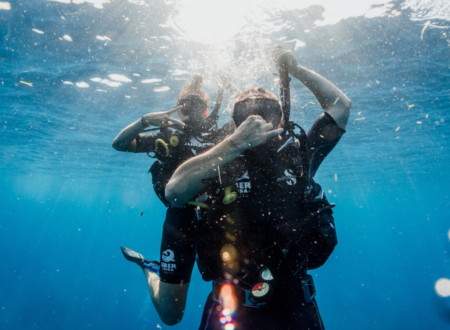Dive Into Underwater Adventures, Safely
If you’re diving headfirst into the underwater world of scuba diving, remember the golden rule: safety first! To ensure you make a memorable experience in the right way, we present the 10 golden rules of scuba diving. Follow these guidelines, and you’re guaranteed a safe and fun diving experience.
Rule 1: Always Check Your Gear
Before you dive into the deep blue, make sure your gear is in perfect condition. From the oxygen tank to the diving suit, a thorough gear check can be the difference between a perfect dive and a stressful one.

Rule 2: Never Hold Your Breath
Never hold your breath. But why? When you descend, the increasing pressure compresses the air in your lungs. Conversely, when you ascend, the pressure decreases and the air in your lungs expands. Holding your breath while ascending, even slightly, can lead to lung over-expansion, causing severe injury.
To breathe properly while diving, adopt a slow, deep, and continuous breathing pattern. Exhale fully to allow your body to expel as much carbon dioxide as possible. Inhaling should be natural, not forced. Think of it as a meditative process, in sync with the tranquility of the underwater world.
This method ensures a constant flow of air through your lungs, minimizes the risk of over-expansion, and helps conserve your air supply. So, remember the mantra: breathe easy, dive safely.
Rule 3: Ascend Slowly and Safely

Rapid ascension can cause decompression sickness, or ‘the bends,’ due to the formation of gas bubbles in the bloodstream. This results from the swift decrease in pressure as you rise. Therefore, a slow, controlled ascent—no faster than 18 meters (60 feet) per minute—allows your body time to safely eliminate these gases, preventing this dangerous condition. It’s often helpful to pause at 5 meters (15 feet) for 3 minutes as a safety stop.
Rule 4: Maintain Proper Buoyancy
Maintaining neutral buoyancy is vital. Too much or too little can lead to uncontrolled ascents or descents, disturbing marine life, or causing injury.
Rule 5: Always Plan Your Dive
Planning your dive and diving your plan should be your mantra. Knowing your entry and exit points, depth limits, and air supply can make your dive smooth and stress-free.
Rule 6: Never Dive Beyond Your Training
While the mystery of the deep might tempt you, never venture beyond the limits of your training. The deep sea holds risks that require specific skills to navigate.
Rule 7: Respect Marine Life
Remember, you’re a guest in the underwater world. Avoid touching, feeding, or disturbing marine life.

Rule 8: Stay with Your Buddy
Scuba diving is a team sport. Staying close to your buddy ensures you can help each other in case of any emergency.
Rule 9: Always Stay within Your Comfort Zone

Scuba diving should be an enjoyable experience, not a test of endurance. If a situation makes you uncomfortable—be it water clarity, current strength, depth, equipment issues, or even your own physical or mental state—do not proceed. It’s critical to recognize your limits and stick to them, as pushing beyond can lead to unnecessary risk. Remember, there’s no shame in calling off a dive; your safety and wellbeing is way more important.
Rule 10: Continually Learn and Practice
In scuba diving, education and experience go hand in hand. Regularly refreshing your knowledge through courses keeps critical safety protocols top of mind. Similarly, continuously practicing skills, whether basic or advanced, ensures you remain competent and comfortable underwater. By embracing lifelong learning in diving, you can encounter new situations confidently, improving your overall experience and safety.
Dive With Knowledge, Dive With Confidence

Following these 10 golden rules of scuba diving can ensure that you’re set for a safe, exciting adventure underwater. So, suit up, dive in, and explore the marine world responsibly.
Remember, the sea is both a wonder and a force. With these rules in your pocket, you’ll be well-equipped to enjoy its beauty and respect its power. Safe diving!





